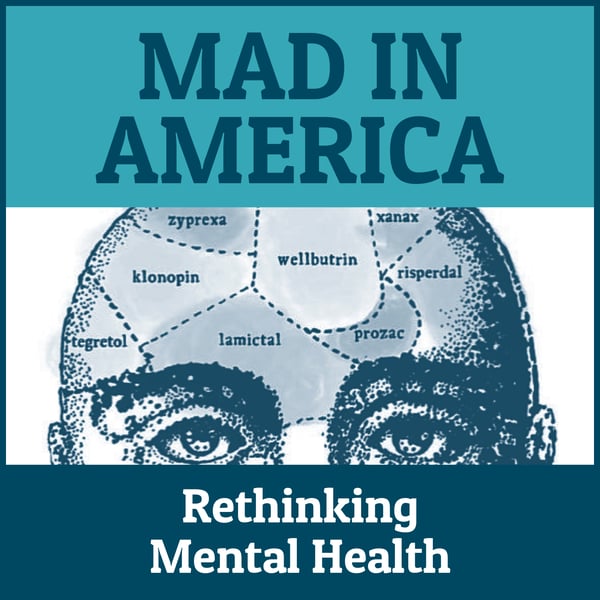All Real Living Is Meeting - In Conversation With Brent Robbins - Part 2
Mad in America: Rethinking Mental Health
Mad in America
4.8 • 201 Ratings
🗓️ 12 February 2025
⏱️ 52 minutes
🧾️ Download transcript
Summary
Brent Dean Robbins is a psychologist, scholar, and all-around thoughtful human whose work has profoundly shaped existential and humanistic psychology.
He is one of those rare thinkers who makes psychology feel alive—not just a collection of theories and data, but a field full of urgent, deeply human questions. He’s a professor of psychology and the director of the Psy.D. in Clinical Psychology program at Point Park University, where he’s helped create one of the most distinctive training programs in the country. He earned his Ph.D. in Clinical Psychology from Duquesne University—home to some of the most beautifully dense phenomenological work you'll ever have to read twice—and is a licensed psychologist in Pennsylvania.
In this two-part conversation, we’ll explore Brent’s career—from his early work critiquing the overmedication of children to his scholarship on metabletics and cultural therapeutics. We’ll also discuss how he’s navigating his current health journey and cancer diagnosis as an existential psychologist and his hopes for the future of the field—how we might reimagine mental health care in ways that embrace the messy, wondrous, irreducible nature of being human.
***
Thank you for being with us to listen to the podcast and read our articles this year. MIA is funded entirely by reader donations. If you value MIA, please help us continue to survive and grow. https://www.madinamerica.com/donate/
To find the Mad in America podcast on your preferred podcast player, click here: https://pod.link/1212789850
© Mad in America 2025. Produced by James Moore https://www.jmaudio.org
Transcript
Click on a timestamp to play from that location
| 0:00.0 | Welcome to the Madden America podcast, your source for science, psychiatry, and social justice. |
| 0:14.8 | Welcome back to the Madden America Rethinking Mental Health podcast. I'm your host, Justin Carter. And today we're picking up where we left |
| 0:22.4 | off with Dr. Brent Dean Robbins, psychologist, scholar, and someone who has spent his life thinking deeply |
| 0:27.9 | about what it actually means to be human. In part one, we talked about the big picture stuff. |
| 0:33.2 | Brent's early influences, his critiques of mainstream psychiatry, and his work in diagnostic reform. |
| 0:39.0 | If you haven't listened to that yet, I'd recommend going back and checking that out first. |
| 0:43.0 | Now, in part two, we get personal. |
| 0:45.5 | We talk about Brent's book, A Medicalized Body, and Anacetic Culture, which unpacks how modern medicine |
| 0:50.7 | tries to shield us from the rawness of suffering and death, and in doing so, |
| 0:54.9 | maybe dulls what it means to really live. We explore his love for humanistic psychology and its |
| 1:00.1 | untapped potential, and we talk about his own health journey, what it means to confront mortality, |
| 1:05.8 | not just as a psychologist, but as a person, living in real time with all the uncertainty and rawness that |
| 1:12.2 | entails. For me, this is one of the most important conversations I've had the pleasure of having |
| 1:17.2 | on this podcast. Here we go. This links up to your book, The Medicalized Body and Anasetic Culture, |
| 1:24.2 | which goes beyond the sort of usual critique of medicalization, maybe critical psychiatry |
| 1:30.2 | work that we're taking social problems and moving them into the medical sphere and actually says |
| 1:36.5 | that this becomes a, you know, this can be, the medical gaze can be a useful lens in solving |
| 1:40.8 | certain sorts of problems, but when it becomes a dominant cultural gaze |
| 1:45.0 | through which we interpret ourselves and the world, it becomes really problematic and |
| 1:50.9 | pathogenic, as you say. |
| 1:52.6 | Could you say more about how your work on medicalization connects up to sort of the cultural |
| 1:58.2 | problems that you see being at the root of some of the mental |
... |
Please login to see the full transcript.
Disclaimer: The podcast and artwork embedded on this page are from Mad in America, and are the property of its owner and not affiliated with or endorsed by Tapesearch.
Generated transcripts are the property of Mad in America and are distributed freely under the Fair Use doctrine. Transcripts generated by Tapesearch are not guaranteed to be accurate.
Copyright © Tapesearch 2025.

